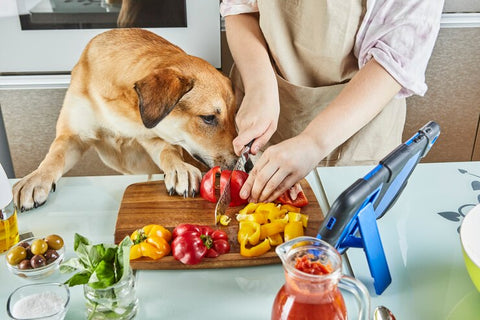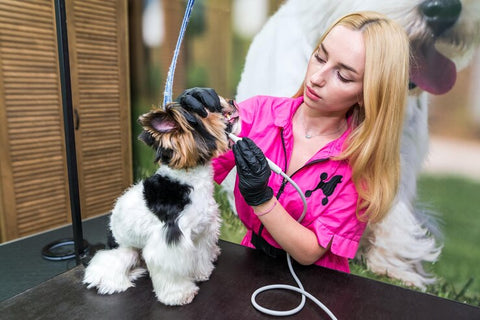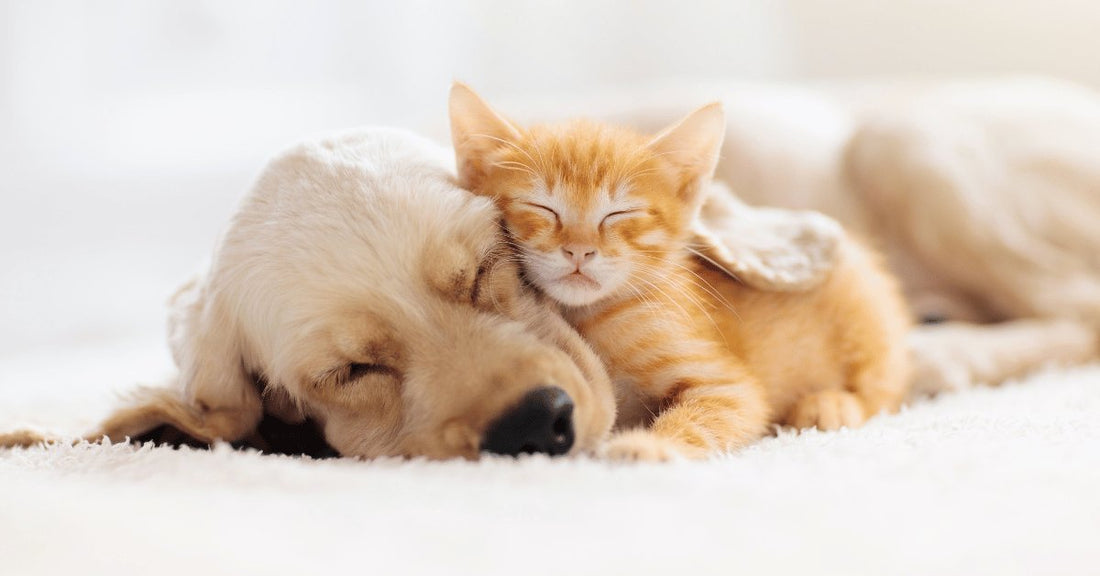As pet owners, ensuring our furry friends get a restful night's sleep is crucial for their overall health and well-being. Just like humans, pets need quality sleep to recharge and thrive. Here are some tips to help you ensure your beloved companion gets the peaceful rest they deserve.
Creating a Comfortable Sleeping Environment
Creating a comfortable sleeping environment for your pet is essential for their overall health and well-being. Here are some tips to ensure your furry friend gets a good night's rest:
- Choose the Right Bed: Select a bed that is appropriate for your pet's size, age, and sleeping habits. Whether it's a plush mattress, orthopedic bed, or cozy cave, choose a bed that provides adequate support and comfort for your pet.
- Consider Sleeping Preferences: Take into account your pet's sleeping preferences, such as whether they like to curl up or stretch out when they sleep. Some pets may prefer a bolstered bed for extra support, while others may enjoy a flat surface or a heated bed for added warmth.
- Location Matters: Place your pet's bed in a quiet and peaceful area of your home, away from noisy appliances, high-traffic areas, and direct sunlight. Providing a designated sleeping spot helps your pet feel safe and secure, promoting better sleep.
- Temperature Regulation: Ensure that your pet's sleeping area is kept at a comfortable temperature year-round. During colder months, provide warm bedding or blankets, while in warmer weather, ensure adequate ventilation and airflow to prevent overheating.
- Clean and Fresh Bedding: Regularly wash your pet's bedding to remove dirt, hair, and odors, keeping it clean and fresh. Use pet-safe detergent and follow the care instructions provided by the manufacturer to maintain the integrity of the materials.
- Create a Bedtime Routine: Establish a consistent bedtime routine for your pet to help them wind down and prepare for sleep. This may include a short walk, playtime, or quiet cuddle session before bedtime to promote relaxation and calmness.
- Limit Distractions: Minimize noise and distractions in your pet's sleeping area, such as loud music, television, or other pets. Creating a peaceful environment allows your pet to relax and fall asleep more easily.
- Provide Comfort Items: Consider adding comfort items to your pet's sleeping area, such as a favorite toy, blanket, or article of clothing with your scent on it. These familiar items can provide comfort and reassurance, especially for pets who experience separation anxiety.
By following these tips, you can create a comfortable and inviting sleeping environment for your pet, ensuring they get the restful sleep they need to stay happy and healthy.

Establishing a Bedtime Routine
Consistency is key when it comes to bedtime routines for pets. Establish a regular schedule for feeding, playtime, and bedtime. Incorporate calming activities before bed, such as gentle petting or a relaxing massage, to help your furry friend unwind.

Regular Exercise
Regular exercise is essential for your pet's overall health and can promote better sleep. Engage your furry friend in daily activities such as walks, playtime, or interactive games. Tailor the exercise routine to suit your pet's age, breed, and energy level.

Diet and Nutrition
Diet and nutrition play a crucial role in the health and well-being of pets. Providing a balanced and nutritious diet is essential for ensuring that pets receive the nutrients they need to thrive. Here are several key aspects of diet and nutrition for pets:
- Quality Ingredients: Choose pet foods made from high-quality ingredients that meet the nutritional needs of your pet. Look for products that list a high-quality protein source as the first ingredient and avoid foods containing fillers, artificial additives, and by-products.
- Balanced Nutrition: Ensure that your pet's diet provides a balance of essential nutrients, including proteins, carbohydrates, fats, vitamins, and minerals. Consult with your veterinarian to determine the appropriate nutrient requirements for your pet's age, breed, size, and health status.
- Proper Portion Control: Practice portion control to prevent overfeeding or underfeeding your pet. Follow feeding guidelines provided by the pet food manufacturer based on your pet's weight, age, and activity level. Avoid free-feeding, and divide daily food portions into multiple meals to help regulate appetite and prevent obesity.
- Hydration: Ensure that your pet has access to fresh, clean water at all times. Proper hydration is essential for maintaining overall health, regulating body temperature, and supporting vital organ functions. Monitor your pet's water intake, especially during hot weather or periods of increased activity.
- Special Dietary Needs: Some pets may have specific dietary needs due to allergies, food sensitivities, or underlying health conditions. Work with your veterinarian to identify any dietary restrictions or special requirements and choose appropriate pet foods or supplements tailored to your pet's needs.

Check out the best selling pet supplies this year!
Addressing Anxiety and Stress
Pets can experience anxiety and stress, which can impact their sleep quality. Learn to recognize signs of anxiety in your pet and address any underlying issues. Consider using calming aids such as pheromone diffusers or herbal supplements to help alleviate anxiety.
Medical Considerations
If your pet is experiencing sleep disturbances, it's essential to consult with a veterinarian to rule out any underlying medical conditions. Discuss any concerns or changes in behavior with your vet to ensure your pet receives the appropriate care and treatment.
Grooming and Comfort
Regular grooming can contribute to your pet's comfort and overall well-being. Establish a grooming routine that includes brushing, bathing, and nail trimming to keep your furry friend clean and comfortable.

Monitoring Sleeping Patterns
Pay attention to your pet's sleeping patterns and behavior. Understand their typical sleep cycles and recognize any signs of sleep disturbances or discomfort. If you notice any changes, consult with your veterinarian for further evaluation.
Training and Positive Reinforcement
Encourage good sleep habits in your pet through positive reinforcement techniques. Reward calm and relaxed behavior at bedtime to reinforce positive sleep habits.
Creating a Safe Environment
Ensure your pet's sleeping area is safe and free from potential hazards. Pet-proof the area by removing any small objects, cords, or potential choking hazards that could pose a risk to your pet's safety.
The Importance of Mental Stimulation
The importance of mental stimulation for pets cannot be overstated. Just like humans, pets require mental exercise to stay healthy, happy and engaged. Here are several reasons why mental stimulation is essential for pets:
- Prevents Boredom and Behavioral Issues: Mental stimulation helps prevent boredom in pets, which can lead to destructive behaviors such as chewing, excessive barking, or aggression. Engaging activities keep pets mentally active and prevent them from becoming restless or frustrated.
- Promotes Cognitive Function: Mental stimulation exercises your pet's brain, promoting cognitive function and problem-solving skills. Activities such as puzzle toys, training sessions, and interactive games encourage pets to think, learn, and adapt to new challenges.
- Reduces Anxiety and Stress: Mental stimulation provides an outlet for pets to release pent-up energy and reduce stress and anxiety. Engaging activities help alleviate boredom and provide a sense of accomplishment, leading to improved overall well-being.
- Strengthens Bond with Pet Owners: Engaging in mentally stimulating activities with your pet strengthens the bond between pet and owner. Training sessions, interactive play, and enrichment activities provide opportunities for quality time and positive interactions, fostering a deeper connection.
- Enhances Physical Health: Mental stimulation often involves physical activity, such as running, jumping, or playing. These activities promote physical exercise, which is essential for maintaining a healthy weight, cardiovascular health, and muscle tone in pets.
- Prevents Cognitive Decline in Senior Pets: Mental stimulation is particularly important for senior pets to help prevent cognitive decline and keep their minds sharp as they age. Engaging in brain games, training exercises, and interactive toys can help stimulate their aging brains and maintain cognitive function.
- Provides Enrichment and Variety: Mental stimulation enriches pets' lives by providing variety and stimulation in their daily routines. Introducing new toys, activities, and environments keeps pets engaged and prevents them from becoming bored with their surroundings.
- Encourages Natural Behaviors: Many mentally stimulating activities mimic natural behaviors that pets would engage in the wild, such as foraging, hunting, and problem-solving. Providing outlets for these instincts allows pets to express their natural behaviors in a safe and controlled environment.
Overall, mental stimulation is an essential aspect of pet care that promotes physical, cognitive, and emotional well-being. By incorporating engaging activities, training sessions, and enrichment opportunities into your pet's daily routine, you can ensure they lead a fulfilling and happy life.

Seeking Professional Help
If you're struggling to address your pet's sleep issues, don't hesitate to seek professional help. Consult with a professional trainer or behaviorist who can offer guidance and support. Explore alternative therapies such as acupuncture or massage to help alleviate sleep disturbances.
Share your experience with us on Shaggy Chic.
Conclusion
Ensuring your furry friend gets a restful night's sleep is essential for their overall health and well-being. By creating a comfortable sleeping environment, establishing a bedtime routine, and addressing any underlying issues, you can help your pet enjoy a peaceful night's rest.
FAQs
1. How many hours of sleep does my pet need each night?
It varies by age and species, but generally:
- Dogs: 12-14 hours (adults), up to 18 hours (puppies/seniors)
- Cats: 12-16 hours (adults), more for kittens/seniors.
2. Can anxiety medication help improve my pet's sleep?
Yes, if prescribed by a vet for anxiety-related sleep issues.
3. What are some signs of sleep disturbances in pets?
Daytime sleepiness, restlessness at night, vocalization, irritability, changes in appetite/grooming, frequent waking.
4. Are there any natural remedies to help my pet sleep better?
Yes, including aromatherapy, herbal supplements (with vet approval), calming routines, and a comfy sleep environment.
5. How can I discourage my pet from sleeping in my bed?
Provide a comfortable pet bed, redirect them to it consistently, reward them for using it, and be firm about bed boundaries.

